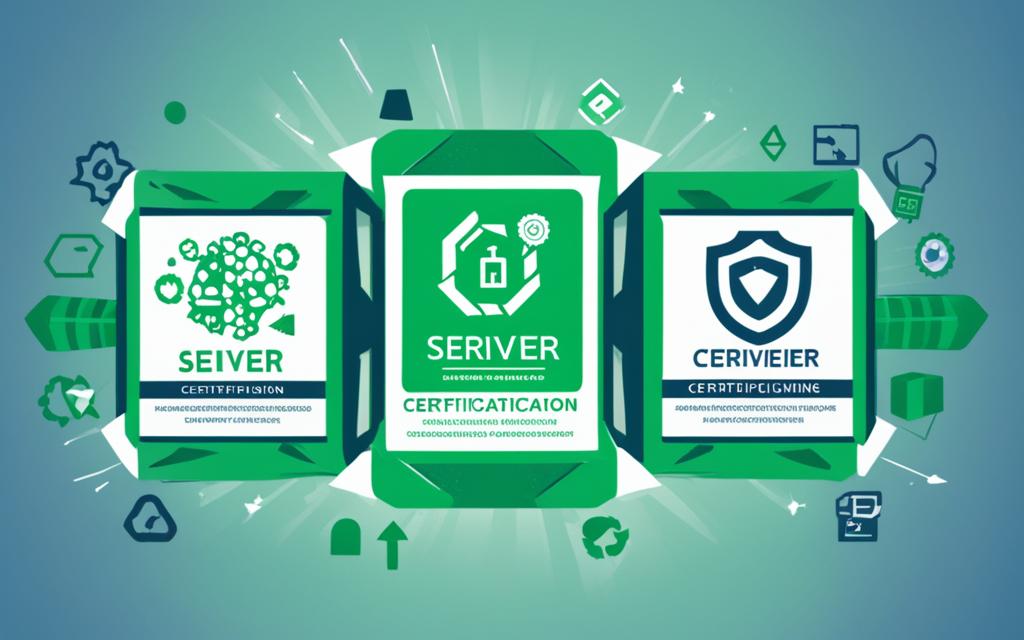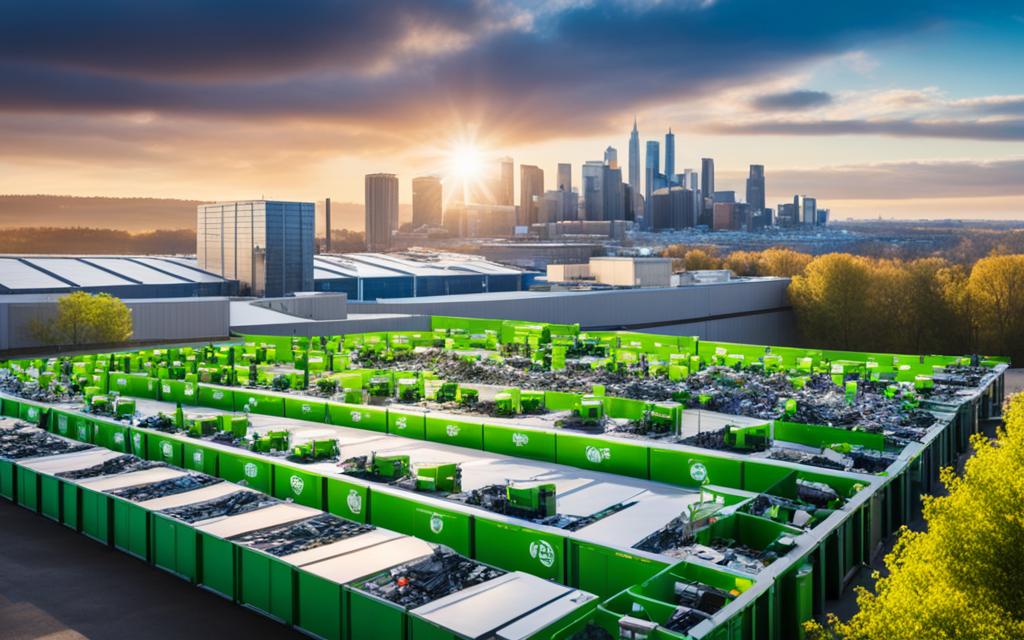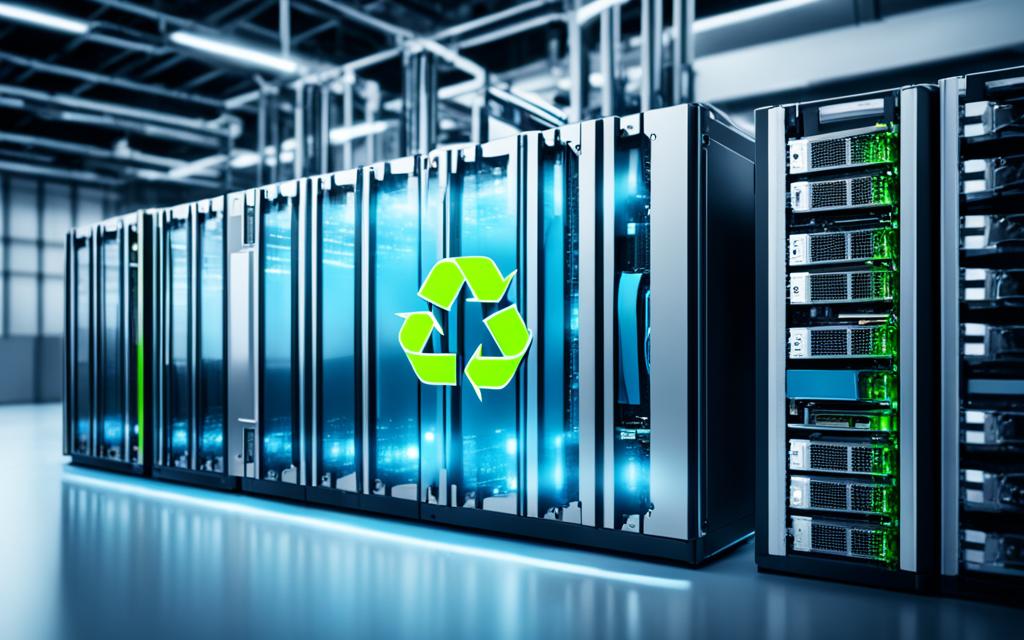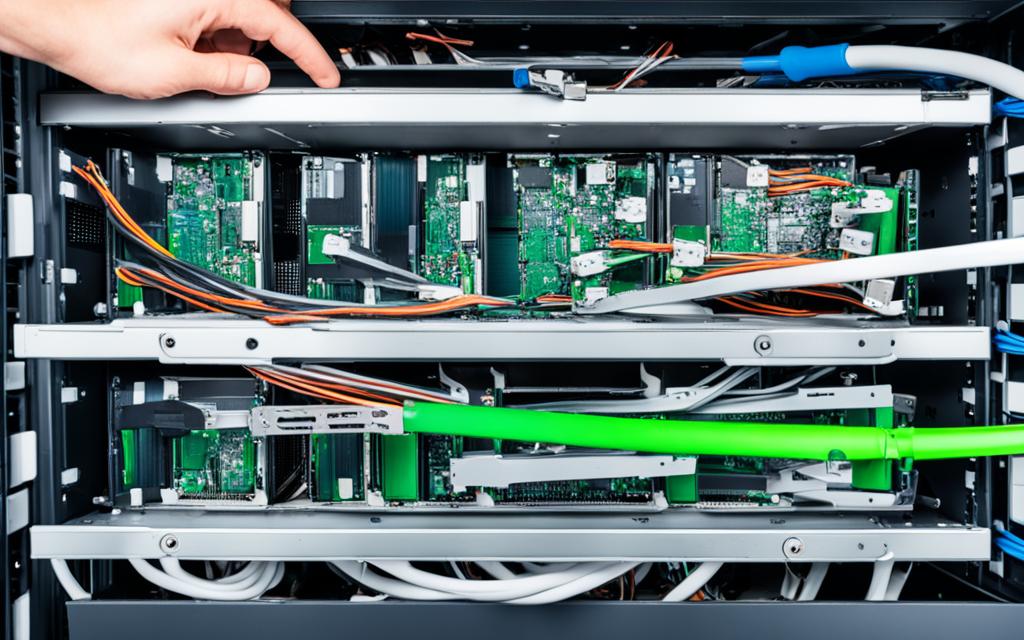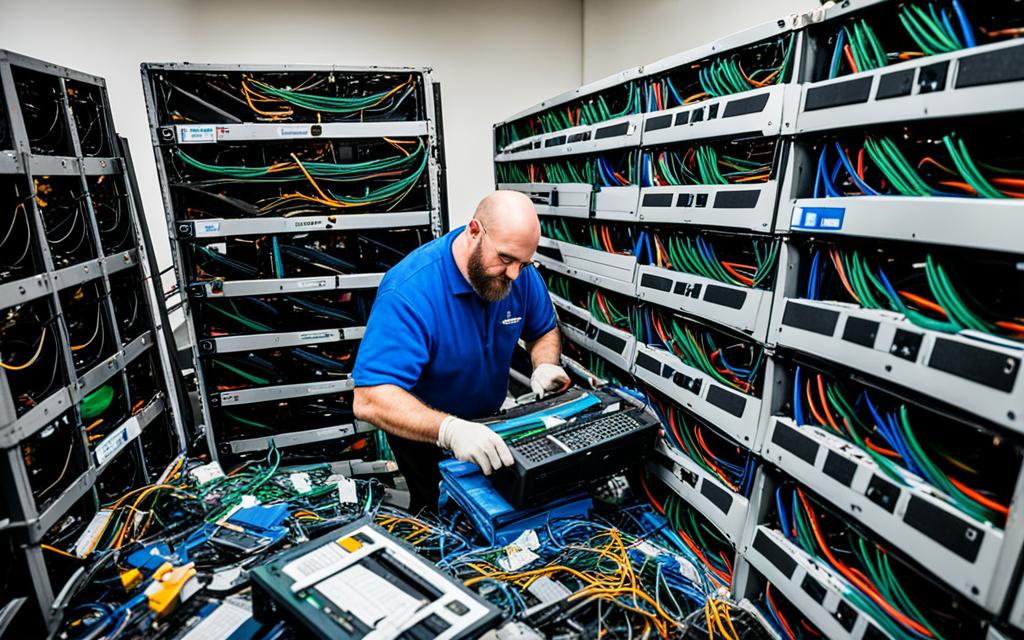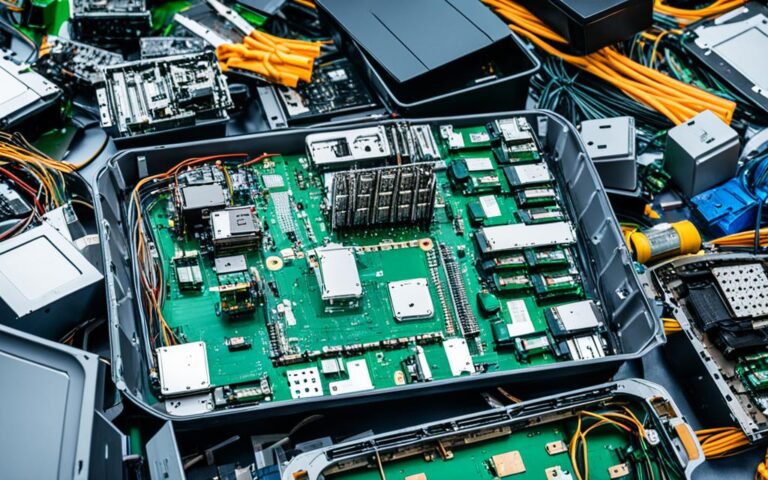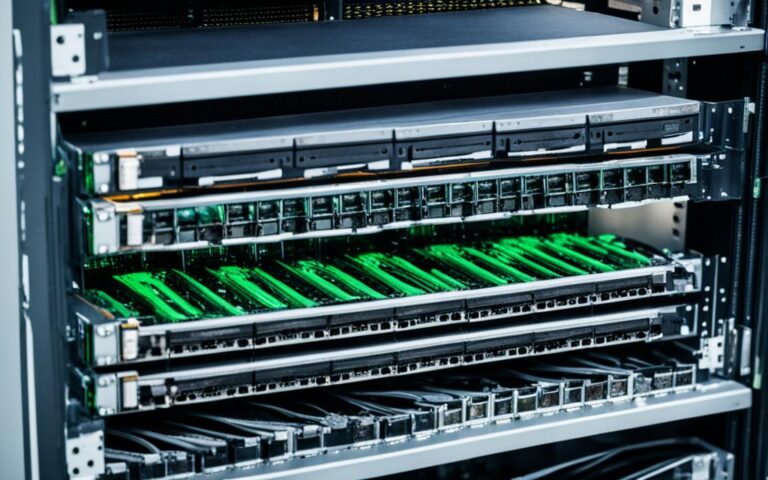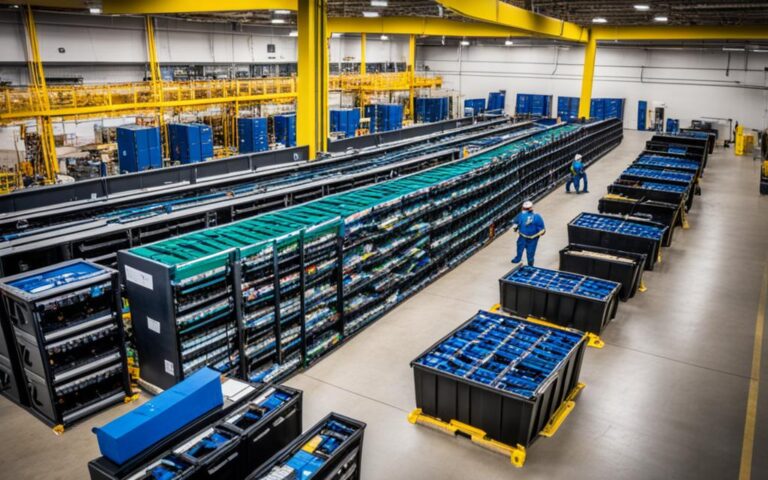The Importance of Certifications in Server Recycling Operations
Are you passionate about sustainable IT practices and secure data handling in the UK’s tech landscape? Then server recycling certifications should be on your radar. These certifications are not just badges to display; they hold immense importance in ensuring responsible and secure server recycling operations.
With the increasing awareness of the environmental impact of electronic waste (e-waste), certifications play a crucial role in promoting sustainable practices. By adhering to the standards set by certifications, companies are able to maximize device reuse and recycling, minimize negative environmental impacts, and ensure safe data management. This means that your unwanted servers will be handled responsibly, reducing their contribution to the e-waste problem.
One of the major certifications in the electronics recycling industry is the e-Stewards® Standard for Responsible Recycling (e-Stewards®), which verifies that companies follow best management practices. Another important certification is the Sustainable Electronics Recycling International (SERI®) Responsible Recycling (R2) Standards for Electronics Reuse and Recycling. R2v3 is the latest iteration of the R2 certification, offering clarified requirements and an increased emphasis on reuse, improvements in material flow management, and a focus on environmental health and safety and data security.
By choosing companies with these certifications, you can be assured that your servers will be handled with care and expertise. Additionally, R2v3 certification includes specialty process requirements for specific tasks like shredding and data erasure. It also establishes a network of interconnected partners called the Downstream Recycling Chain to uphold standards and maintain accountability throughout the entire recycling process.
But why are these certifications so important? They are essential in reducing the environmental and human health effects of server recycling. E-waste represents a significant portion of toxic waste in landfills, and by choosing certified recyclers, you can help prevent valuable materials from ending up in these hazardous environments. Moreover, responsible server recycling contributes to resource conservation, energy savings, and a more sustainable future.
Certifications, such as R2v3, provide several benefits for server recycling operations. They ensure responsible recycling practices, promote the circular economy by maximizing recyclable materials, and prioritize data security through stringent standards for data destruction. By aligning with these certifications and supporting certified IT asset disposition (ITAD) providers for data destruction, you can meet regulatory requirements, protect customer data, and prevent costly security breaches.
In conclusion, certifications are not just symbols of credibility; they are the foundation of secure and sustainable server recycling practices in the UK’s tech landscape. They contribute to reducing environmental impact, promoting responsible stewardship, and safeguarding data privacy. So, when it comes to server recycling, don’t overlook the importance of certifications that ensure the highest standards of sustainability and security.
The Environmental and Human Health Effects of Server Recycling
Improper server recycling can have significant environmental and human health impacts. When electronic waste, or e-waste, is not disposed of responsibly, it contributes to the growing global issue of toxic landfill waste. In fact, while e-waste only represents 2% of total landfill waste in the US, it accounts for a staggering 70% of overall toxic waste in landfills.
This alarming statistic underscores the urgent need for sustainable practices in server recycling. By sending servers to certified downstream vendors, such as those with R2v3 certification, we can ensure the safe processing of materials and minimize the risk of hazardous substances seeping into our environment. These certifications guarantee that e-waste is properly handled, preventing it from ending up in landfills and avoiding potential negative consequences for our planet and human health.
Reusing and recycling electronic devices can also have a profound positive impact on the environment. By extending the lifespan of servers through reuse, we reduce the energy consumption associated with manufacturing new devices. Additionally, recycling electronic devices allows for the recovery of valuable materials, such as precious metals like gold, while reducing the need for environmentally damaging mining practices.
Consider this: the creation of a single smartphone requires a staggering amount of energy—1 gigajoule—and utilizes various metals sourced from over 34 kg of ore. By recycling and repurposing electronic devices, we can conserve these limited natural resources, decrease our reliance on raw material extraction, and reduce our carbon footprint.
Overall, server recycling plays a crucial role in mitigating the environmental impact of e-waste while promoting sustainable practices. By prioritizing responsible recycling and partnering with R2v3 certified companies, we can preserve our environment, safeguard human health, and create a more sustainable future.
The Benefits of R2v3 Certification for Server Recycling
R2v3 certification offers numerous advantages for server recycling operations. By obtaining this certification, companies can ensure responsible recycling practices, reduce their environmental impact, and promote the reuse and recycling of electronic equipment. R2v3 places a strong emphasis on the circular economy, facilitating the maximum utilization of recyclable materials while minimizing waste.
One of the key benefits of R2v3 certification is the stringent focus on data security. Certified vendors follow strict standards for data destruction, guaranteeing the secure disposal of sensitive information. This ensures that organizations can trust the certified recyclers with their data and mitigates the risk of data breaches.
Choosing R2v3 certified recyclers also allows businesses to align themselves with industry best practices, demonstrating a commitment to ethical recycling practices and responsible stewardship. This certification signifies a dedication to sustainable practices, supporting the principles of the circular economy and the reduction of electronic waste.
Furthermore, R2v3 certified companies actively contribute to environmental sustainability efforts. By participating in responsible recycling and adhering to the certification’s standards, they help conserve valuable resources and reduce the negative impact on the environment.
Benefits of R2v3 Certification for Server Recycling
- Promotes responsible recycling practices
- Reduces environmental impact
- Maximizes reuse and recycling of electronic equipment
- Enhances data security through stringent data destruction standards
- Aligns with industry best practices and demonstrates ethical recycling
- Contributes to sustainability efforts and the circular economy
The table below provides a comparison of R2v3 certification with other server recycling certifications:
| R2v3 Certification | Other Certifications | |
|---|---|---|
| Environmental Focus | Emphasizes the circular economy and responsible recycling practices | Varies; may or may not prioritize environmental sustainability |
| Data Security Standards | Strict standards for data destruction and secure disposal | Varies; may or may not have robust data security measures |
| Industry Recognition | Widely recognized and respected in the electronics recycling industry | Dependent on specific certification and industry reputation |
| Contribution to Sustainability | Supports the principles of the circular economy and reduces electronic waste | Varies; may or may not have a specific focus on sustainability |
R2v3 certification not only meets regulatory requirements but also enables businesses to make a positive impact on the environment and society. By choosing R2v3 certified recyclers, organizations actively contribute to sustainable practices, reduce electronic waste, and support the principles of the circular economy.
The Role of Certifications in Secure Data Destruction
Certified data destruction is crucial for maintaining compliance and avoiding expensive security breaches. Organizations in heavily regulated industries such as medicine, finance, and education must protect sensitive information under laws like HIPAA, FERPA, and the CCPA.
Certified data destruction ensures that data-bearing devices are securely disposed of and that all data is completely removed and unreadable. Certifications guarantee a reliable and auditable chain of custody, providing transparency and evidence of proper disposal.
“Certifications ensure that data-bearing devices are securely disposed of and that all data is completely removed and unreadable.”
Documentation, such as Certificates of Destruction and data destruction audits, offers detailed records of devices destroyed, data sanitization methods used, and potential liabilities.
Benefits of Certified Data Destruction:
- Ensure compliance with regulations
- Protect customer data
- Safeguard reputation
- Prevent costly security breaches
By working with certified IT asset disposition (ITAD) providers for data destruction, organizations can meet regulatory requirements, protect customer data, safeguard their reputation, and prevent costly security breaches.
| Benefits of Certified Data Destruction | |
|---|---|
| Compliance with regulations | Certifications ensure organizations meet legal requirements for data protection. |
| Protect customer data | Certified data destruction guarantees the secure removal of sensitive information. |
| Safeguard reputation | Organizations can maintain trust and goodwill by demonstrating a commitment to data security. |
| Prevent costly security breaches | Proper data destruction reduces the risk of data breaches and associated financial liabilities. |
By prioritizing certified data destruction, organizations take proactive measures to ensure compliance, protect sensitive information, and mitigate the risk of security breaches.
Conclusion
In conclusion, certified data destruction and responsible recycling practices are paramount in the UK’s tech landscape. By obtaining certifications like R2v3 and e-Stewards, organizations ensure compliance with regulations, protect the environment, and promote a sustainable future.
These certifications play a critical role in maximizing the reuse and recycling of electronic equipment, minimizing the negative environmental impact of improper recycling. Moreover, certified IT recycling vendors offer secure data destruction services, ensuring sensitive information is completely removed and safeguarded against data breaches.
By choosing certified IT recycling vendors and data destruction services, businesses contribute to a more sustainable future by reducing electronic waste and conserving valuable resources. They also demonstrate their commitment to ethical recycling practices and responsible stewardship, protecting data privacy and avoiding costly security breaches.
Certifications are the cornerstone of secure and sustainable server recycling practices, providing organizations with the peace of mind that they are fulfilling their environmental, ethical, and regulatory obligations. Embracing the best practices and standards upheld by certified data destruction and responsible recycling certifications not only benefits businesses but also creates a positive impact on the environment and the broader community.
FAQ
What certifications are important for server recycling operations?
Two major certifications in the electronics recycling industry are the e-Stewards® Standard for Responsible Recycling (e-Stewards®) and Sustainable Electronics Recycling International (SERI®) Responsible Recycling (R2) Standards for Electronics Reuse and Recycling.
What do these certifications verify?
These certifications verify that companies follow best management practices, maximize device reuse and recycling, minimize negative environmental impacts, ensure safe data management, and require data destruction.
What is R2v3 certification?
R2v3 is the latest iteration of the R2 certification, offering clarified requirements, an increased emphasis on reuse, improvements in material flow management, and a focus on environmental health and safety and data security.
What does R2v3 certification include?
R2v3 certification includes specialty process requirements for specific tasks like shredding and data erasure. Additionally, R2 employs a network of interconnected partners called the Downstream Recycling Chain to uphold standards and maintain accountability.
What are the environmental and human health impacts of improper server recycling?
Improper server recycling can result in significant environmental and human health impacts. E-waste represents only 2% of total landfill waste in the US but accounts for 70% of the overall toxic waste in landfills.
How does server recycling contribute to sustainability?
Reusing and recycling devices reduces energy consumption, decreases reliance on mining and raw material extraction, and conserves limited natural resources. Recycling electronic devices also allows for the recovery of precious metals like gold while reducing the environmental burden of mining.
What are the benefits of R2v3 certification for server recycling?
R2v3 certification ensures responsible recycling practices, reduces environmental impact, promotes the reuse and recycling of electronic equipment, and emphasizes the circular economy. It also enforces stringent standards for data destruction, ensuring the secure disposal of sensitive information.
Why is certified data destruction important?
Certified data destruction is crucial for maintaining compliance and avoiding expensive security breaches. Organizations in heavily regulated industries must protect sensitive information under laws like HIPAA, FERPA, and the CCPA.
How does certified data destruction provide transparency and evidence of proper disposal?
Certified data destruction guarantees a reliable and auditable chain of custody, providing transparency and evidence of proper disposal. Documentation, such as Certificates of Destruction and data destruction audits, offers detailed records of devices destroyed, data sanitization methods used, and potential liabilities.

